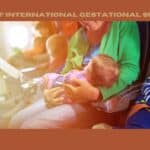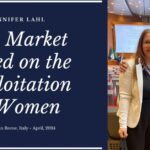Last night was our third theatrical screening of Breeders: A Subclass of Women?. The Roxie Theater is in the heart of the San Francisco Mission district and it is an icon for those familiar with this beautiful city. The Roxie is a non-profit organization, which means the venue is quite affordable—a plus for our non-profit.
It was a terribly hot day, and sitting in an air-conditioned, dark theater, the audience settled in. I welcomed everyone telling them that my remarks would be made after the film and hopefully we could have a lively discussion. I explained that I wanted the stories of the film to roll-out and for them to just take them in.
My preference is to always sit in the back of the room so I can gauge the audience reaction. At what points will they typically gasp, or chuckle, or—to use an over-used phrase—lean in. I’m still gathering that data, but the Q & A period is starting to develop some themes. People are baffled by Cindy’s story, “how could that happen?!?” Heather is powerful in describing the little boy she has still not seen to this day. Everyone seems to love the story Tanya tells at the end of the film. This is affirmation to me; as the cameras were rolling I sensed it would be the final word of the film.
I hope you make the time to see Breeders. We are setting up some big screenings in New York, Washington DC, and beyond. You can also buy the DVD or watch it online.
Author Profile

- Jennifer Lahl, MA, BSN, RN, is founder and president of The Center for Bioethics and Culture Network. Lahl couples her 25 years of experience as a pediatric critical care nurse, a hospital administrator, and a senior-level nursing manager with a deep passion to speak for those who have no voice. Lahl’s writings have appeared in various publications including Cambridge University Press, the San Francisco Chronicle, the Dallas Morning News, and the American Journal of Bioethics. As a field expert, she is routinely interviewed on radio and television including ABC, CBS, PBS, and NPR. She is also called upon to speak alongside lawmakers and members of the scientific community, even being invited to speak to members of the European Parliament in Brussels to address issues of egg trafficking; she has three times addressed the United Nations during the Commission on the Status of Women on egg and womb trafficking.
Latest entries
 infertilityApril 23, 2024The Rise of International Gestational Surrogacy in the U.S.
infertilityApril 23, 2024The Rise of International Gestational Surrogacy in the U.S. Assisted Reproductive TechnologyApril 16, 2024Founder Jennifer Lahl’s Speech on Surrogacy to the Casablanca Declaration
Assisted Reproductive TechnologyApril 16, 2024Founder Jennifer Lahl’s Speech on Surrogacy to the Casablanca Declaration #BigFertilityFebruary 27, 2024No, Alabama Didn’t Ban IVF
#BigFertilityFebruary 27, 2024No, Alabama Didn’t Ban IVF ArticleSeptember 25, 2023The Little Engine That Could
ArticleSeptember 25, 2023The Little Engine That Could

